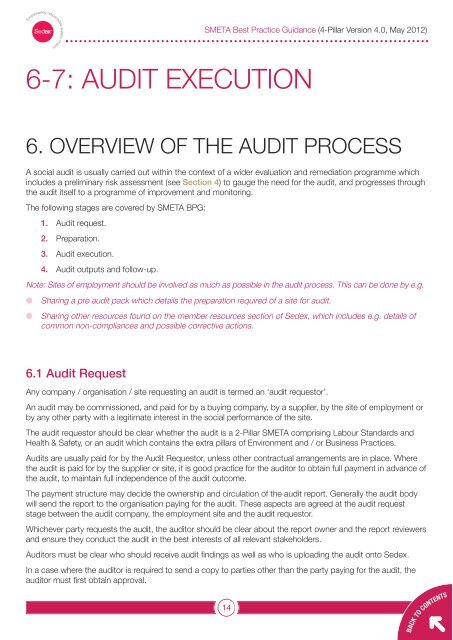Sedex Members Ethical Trade Audit (SMETA) Best Practice Guidance
Sedex Members Ethical Trade Audit (SMETA) Best Practice Guidance
Sedex Members Ethical Trade Audit (SMETA) Best Practice Guidance
Create successful ePaper yourself
Turn your PDF publications into a flip-book with our unique Google optimized e-Paper software.
6-7: AUDIT EXECUTION<br />
6. OVERVIEW OF THE AUDIT PROCESS<br />
A social audit is usually carried out within the context of a wider evaluation and remediation programme which<br />
includes a preliminary risk assessment (see Section 4) to gauge the need for the audit, and progresses through<br />
the audit itself to a programme of improvement and monitoring.<br />
The following stages are covered by <strong>SMETA</strong> BPG:<br />
1. <strong>Audit</strong> request.<br />
2. Preparation.<br />
3. <strong>Audit</strong> execution.<br />
4. <strong>Audit</strong> outputs and follow-up.<br />
Note: Sites of employment should be involved as much as possible in the audit process. This can be done by e.g.<br />
l Sharing a pre audit pack which details the preparation required of a site for audit.<br />
l Sharing other resources found on the member resources section of <strong>Sedex</strong>, which includes e.g. details of<br />
common non-compliances and possible corrective actions.<br />
6.1 <strong>Audit</strong> Request<br />
<strong>SMETA</strong> <strong>Best</strong> <strong>Practice</strong> <strong>Guidance</strong> (4-Pillar Version 4.0, May 2012)<br />
Any company / organisation / site requesting an audit is termed an ‘audit requestor’.<br />
An audit may be commissioned, and paid for by a buying company, by a supplier, by the site of employment or<br />
by any other party with a legitimate interest in the social performance of the site.<br />
The audit requestor should be clear whether the audit is a 2-Pillar <strong>SMETA</strong> comprising Labour Standards and<br />
Health & Safety, or an audit which contains the extra pillars of Environment and / or Business <strong>Practice</strong>s.<br />
<strong>Audit</strong>s are usually paid for by the <strong>Audit</strong> Requestor, unless other contractual arrangements are in place. Where<br />
the audit is paid for by the supplier or site, it is good practice for the auditor to obtain full payment in advance of<br />
the audit, to maintain full independence of the audit outcome.<br />
The payment structure may decide the ownership and circulation of the audit report. Generally the audit body<br />
will send the report to the organisation paying for the audit. These aspects are agreed at the audit request<br />
stage between the audit company, the employment site and the audit requestor.<br />
Whichever party requests the audit, the auditor should be clear about the report owner and the report reviewers<br />
and ensure they conduct the audit in the best interests of all relevant stakeholders.<br />
<strong>Audit</strong>ors must be clear who should receive audit findings as well as who is uploading the audit onto <strong>Sedex</strong>.<br />
In a case where the auditor is required to send a copy to parties other than the party paying for the audit, the<br />
auditor must first obtain approval.<br />
14<br />
BACK TO CONTENTS


